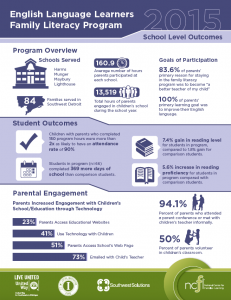Throughout the country students who miss the most school often come from our more vulnerable populations: English Language learners, children with disabilities and students eligible for free or reduced-price meals. It can be tough to address the barriers families with these challenges face when trying to get their children to be in school every day. The National Center for Families Learning (NCFL)’s family literacy model has seen success in bringing together families to build relationships that lead to improved attendance while boosting reading and writing skills.
In southwest Detroit the NCFL’s Family Literacy program is doing just that as part of a Social Innovation Fund project with partners Southwest Counseling Solutions and United Way for Southeastern Michigan. Detroit leads the nation with almost 58 percent of students chronically absent in 2013-2014. Today the increased connection to school and community experienced by families participating in the program has had a positive impact on student attendance. For the 66 children participating in the Southwest Detroit Family Literacy Program, students attended 369 more days of school than comparison children. This comes to more than two additional weeks of instruction over their comparison peers. When parents participated in the program, their children had a higher rate of attendance
(96.89 percent) than comparison children whose families were not involved (92.63 percent).
The Southwest Detroit NCFL program involves mostly Hispanic, low income, English language learner families with children. The model is a family-centered approach to education with four components: Adult Education, Child Education, Parent Time and Parent and Child Together (PACT) Time®. In the Parent Time classes, family members learn parenting skills, increase their understanding of child development, and support each other in their growth as parents. NCFL’s two-generation approach strengthens the bonds between parents and their children to help those who are most at risk of failing economically, emotionally, and socially.
Detroit parent Brenda Cienfuegos says her participation in the NCFL program has helped her daughters feel more comfortable in school. “My oldest daughter Emily had been crying for the past two years because she didn’t want to go to school and I had a hard time taking her to school every day. When I started the program she changed completely. Emily felt safe and she was content knowing that I was at school. This was as reassuring to her as it was to me,” Cienfuegos says.
“It might sound wrong to say it, but it was through this program that I learned more about my daughters. [During] parent time in the classroom I learned certain topics that lead me to understand my daughters better. … I was able to apply what I had learned to help them instead of reprimanding them. This is why I feel that our relation grew stronger,” Cienfuegos adds.
In Detroit the programs are held in classrooms in four public elementary schools. Each day, parents attend classes on site, learning English using a vocabulary that corresponds to the subjects the students are learning in school. For example, parents might learn about cause and effect so they are able to talk with their children about their schoolwork. Parents also spend 30 minutes each day in their child’s classroom, interacting with their kids and engaging in classroom activities.
The final piece of the Detroit program, Family Service learning, brings parents and children together to develop a service project to benefit their community. Families begin by looking around their community to see where there is a gap. With their children’s input, the family investigates what solutions could help, and they all develop a plan. Project development involves computer skills, research, and writing and reading skills, all which improve literacy.
One Detroit family noticed the number of homeless people living on the streets, developed a plan to sew blankets and collect cloths to donate, and finally spent a day preparing food at a local homeless shelter. As families complete projects they become connected to resources in their community, and to leaders in their community, and they become leaders in their school and other groups they have joined.
During the parent education classes, there is a lot of discussion about the importance of attending school every day, There are times when a parent might miss a day or two and they feel uncomfortable coming back, and they often miss another day and fall farther behind. Program leaders help parents understand that the children might have those same sorts of feelings when they miss school, and nudge them to see how much learning they miss when they aren't in class.
NCFL’s model has found success with lower income families throughout the U.S., including Native American, African American and white families.
Since 1989, NCFL has helped more than two million families make educational and economic progress by continuously developing, implementing, and documenting innovative and promising two-generation practices, networks, and learning tools. To learn more, visit NCFL’s website or contact Sharon Darling at sdarling@familieslearning.org.